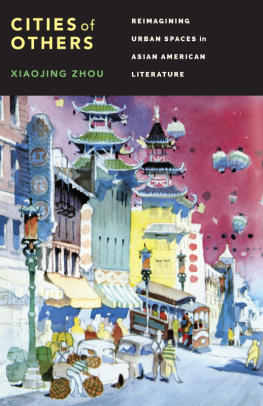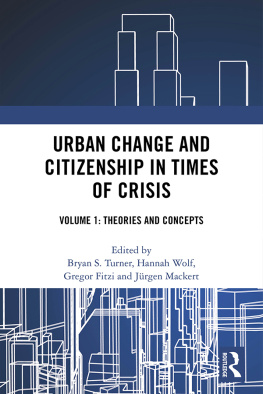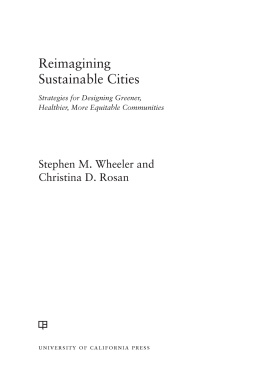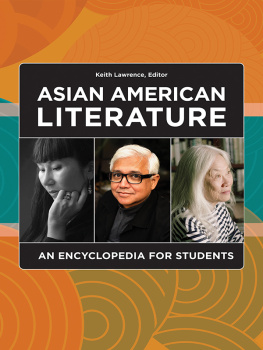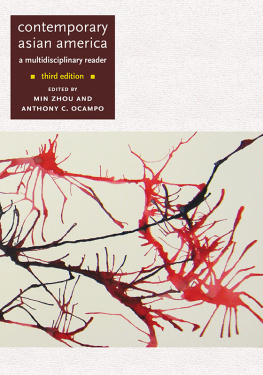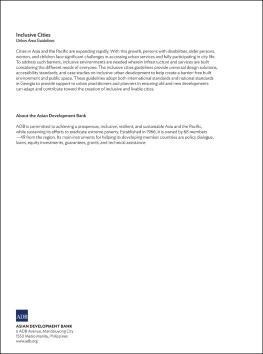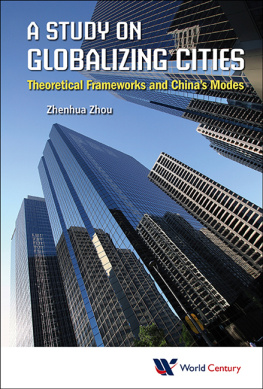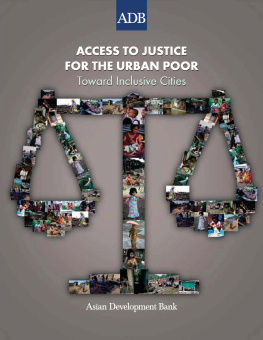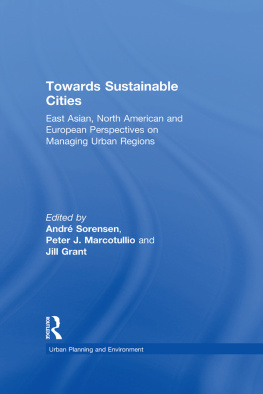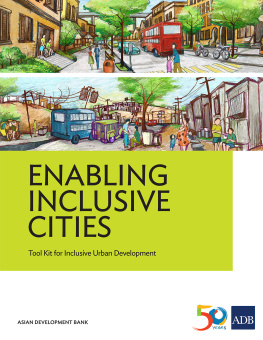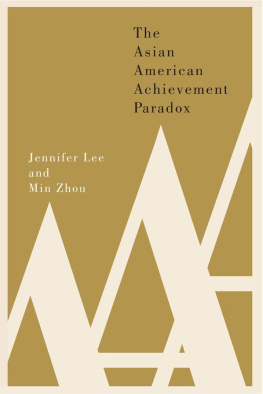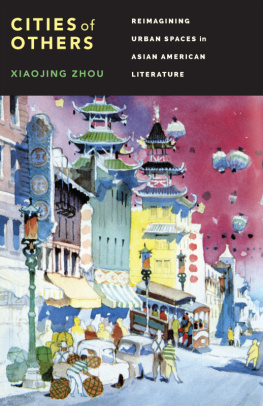Zhou - Cities of Others: Reimagining Urban Spaces in Asian American Literature
Here you can read online Zhou - Cities of Others: Reimagining Urban Spaces in Asian American Literature full text of the book (entire story) in english for free. Download pdf and epub, get meaning, cover and reviews about this ebook. City: Seattle, year: 2015, publisher: University of Washington Press, genre: Science. Description of the work, (preface) as well as reviews are available. Best literature library LitArk.com created for fans of good reading and offers a wide selection of genres:
Romance novel
Science fiction
Adventure
Detective
Science
History
Home and family
Prose
Art
Politics
Computer
Non-fiction
Religion
Business
Children
Humor
Choose a favorite category and find really read worthwhile books. Enjoy immersion in the world of imagination, feel the emotions of the characters or learn something new for yourself, make an fascinating discovery.
Cities of Others: Reimagining Urban Spaces in Asian American Literature: summary, description and annotation
We offer to read an annotation, description, summary or preface (depends on what the author of the book "Cities of Others: Reimagining Urban Spaces in Asian American Literature" wrote himself). If you haven't found the necessary information about the book — write in the comments, we will try to find it.
Zhou: author's other books
Who wrote Cities of Others: Reimagining Urban Spaces in Asian American Literature? Find out the surname, the name of the author of the book and a list of all author's works by series.
Cities of Others: Reimagining Urban Spaces in Asian American Literature — read online for free the complete book (whole text) full work
Below is the text of the book, divided by pages. System saving the place of the last page read, allows you to conveniently read the book "Cities of Others: Reimagining Urban Spaces in Asian American Literature" online for free, without having to search again every time where you left off. Put a bookmark, and you can go to the page where you finished reading at any time.
Font size:
Interval:
Bookmark:

THE SCOTT AND LAURIE OKI SERIES IN ASIAN AMERICAN STUDIES
From a Three-Cornered World: New and Selected Poems by James Masao Mitsui
Imprisoned Apart: The World War II Correspondence of an Issei Couple by Louis Fiset
Storied Lives: Japanese American Students and World War II by Gary Okihiro
Phoenix Eyes and Other Stories by Russell Charles Leong
Paper Bullets: A Fictional Autobiography by Kip Fulbeck
Born in Seattle: The Campaign for Japanese American Redress by Robert Sadamu Shimabukuro
Confinement and Ethnicity: An Overview of World War II Japanese American Relocation Sites by Jeffery F. Burton, Mary M. Farrell, Florence B. Lord, and Richard W. Lord
Judgment without Trial: Japanese American Imprisonment during World War II by Tetsuden Kashima
Shopping at Giant Foods: Chinese American Supermarkets in Northern California by Alfred Yee
Altered Lives, Enduring Community: Japanese Americans Remember Their World War II Incarceration by Stephen S. Fugita and Marilyn Fernandez
Eat Everything Before You Die: A Chinaman in the Counterculture by Jeffery Paul Chan
Form and Transformation in Asian American Literature edited by Zhou Xiaojing and Samina Najmi
Language of the Geckos and Other Stories by Gary Pak
Nisei Memories: My Parents Talk about the War Years by Paul Howard Takemoto
Growing Up Brown: Memoirs of a Bridge Generation Filipino American by Peter Jamero
Letters from the 442nd: The World War II Correspondence of a Japanese American Medic by Minoru Masuda; edited by Hana Masuda and Dianne Bridgman
Shadows of a Fleeting World: Pictorial Photography and the Seattle Camera Club by David F. Martin and Nicolette Bromberg
Signs of Home: The Paintings and Wartime Diary of Kamekichi Tokita by Barbara Johns and Kamekichi Tokita
Nisei Soldiers Break Their Silence: Coming Home to Hood River by Linda Tamura
A Principled Stand: The Story of Hirabayashi v. United States by Gordon K. Hirabayashi, with James A. Hirabayashi and Lane Ryo Hirabayashi
Cities of Others: Reimagining Urban Spaces in Asian American Literature by Xiaojing Zhou
This book is published with the assistance of a grant from the Scott and Laurie Oki Endowed Fund for publications in Asian American Studies.
is book was published thanks in part to generous grants from the College of the Pacific and the University of the Pacific.
2014 by the University of Washington Press
Printed and bound in the United States of America
Composed in Minion Pro, a typeface designed by Robert Slimbach
18 17 16 15 14 5 4 3 2 1
All rights reserved. No part of this publication may be reproduced or transmitted in any form or by any means, electronic or mechanical, including photocopy, recording, or any information storage or retrieval system, without permission in writing from the publisher.
UNIVERSITY OF WASHINGTON PRESS
www.washington.edu/uwpress
Library of Congress Cataloging-in-Publication Data
Zhou, Xiaojing, 1952
Cities of Others : reimagining urban spaces in Asian American literature / Xiaojing Zhou.
pages cm. (The Scott and Laurie Oki Series in Asian American Studies)
Includes bibliographical references and index.
ISBN 978-0-295-99402-4 (hard cover : acid-free paper) ISBN 978-0-295-99403-1 (pbk. : acid-free paper) 1. American literatureAsian American authorsHistory and criticism. 2. Public spaces in literature. 3. Cities and towns in literature. 4. Asian Americans in literature. I. Title.
PS153.A84Z25 2015
810.9895dc23
2014025250
The paper used in this publication is acid-free and meets the minimum requirements of American National Standard for Information SciencesPermanence of Paper for Printed Library Materials, ANSI Z39.481984.
Excerpts from Chinatown Family reprinted with permission by Rutgers University Press.
Excerpts from Bone reprinted with permission by Donadio & Olsen, Inc. 1993 by Fae Myenne Ng.
Excerpts from The Chinaman Pacific & Frisco R. R. Co. reprinted with permission by Coffee House Press. 1988 by Frank Chin.
Excerpts from Donald Duk reprinted with permission by Coffee House Press. 1991 by Frank Chin.
Excerpts from What the Hell for You Left Your Heart in San Francisco reprinted with permission by New Day Publishers. 1987 by Bienvenido N. Santos.
Excerpts from Manhattan Music reprinted with permission by the author, Meena Alexander. 1997 by Meena Alexander, 1997. All rights reserved.
Excerpts from Native Speaker by Chang-rae Lee, 1995 by Chang-rae Lee, used by permission of Riverhead Books, an imprint of Penguin Group (USA) LLC and Granta Publications.
Excerpts from Tropic of Orange reprinted with permission from Coffee House Press. 1997 by Karen Tei Yamashita.
ISBN 978-0-295-80542-9 (ebook)
To my sisters and brother
ACKNOWLEDGMENTS
THIS BOOK GREW OUT OF THE CONVERGENCE OF DIFFERENT BUT interconnected lines of inquiry over the course of a decade. At various stages of its development I have been inspired by numerous scholars and writers whose work continues to invigorate my thinking, pushing me to explore new areas and enabling me to discover unlikely connections. Most are named in my citations of their writings throughout these pages. Some others, however, whose works are not directly referred to in this book but have been crucial to its genesis, must be acknowledged here. Giorgio Agambens Homo Sacer: Sovereign Power and Bare Life was pivotal in the early development of my thinking about the politics of body and space. Li-Young Lees poems about refugees, immigrants, and racial minorities in the city called my attention to the possibilities of reimagining and re-representing the American city and its Others. Lawson Fusao Inadas writings about Japanese Americans in confinement during World War II enhanced my understanding of the importance of rethinking the nation-space. Andrew X. Phams Catfish and Mandala: A Two-Wheeled Voyage through the Landscape and Memory of Vietnam helped me better understand the intersections of race, gender, sexuality, and class in the multilayered displacement of Vietnam War refugees and their children in the American metropolis.
The communities and their leaders I encountered during my research in California Chinatowns in Locke, Los Angeles, San Francisco, and Weaverville have also inspired me. Locke, established by Chinese workers near the levee they built along the Sacramento River after their town at Walnut Grove burned down, is especially important to my learning about history and geography. Connie King, a descendent of one of the original Chinese families in Locke, was a driving force in having a memorial park built and dedicated to its founders. Locke enables me to recognize the importance of space for exclusion and isolation and for resistance to assimilation, invisibility, and historical erasure and amnesia.
My colleagues at University of the Pacific have been a nurturing source for my aspirations. The late Robert Cox showed me Chinatown in Stockton, where Maxine Hong Kingston lived. Camille Norton introduced me to Locke, taking me there and sharing her powerful poem about its historical museum and Chinese school. Cynthia Dobbs spent time reading part of the manuscript and offered insightful comments and suggestions. I am also grateful to Eric Sonstroem for his enthusiastic support and to Jeffrey Hole for sharing his insights on the connections between the nation-sate and empire. My gratitude also goes to University of the Pacific for research fellowships that helped support my research.
Font size:
Interval:
Bookmark:
Similar books «Cities of Others: Reimagining Urban Spaces in Asian American Literature»
Look at similar books to Cities of Others: Reimagining Urban Spaces in Asian American Literature. We have selected literature similar in name and meaning in the hope of providing readers with more options to find new, interesting, not yet read works.
Discussion, reviews of the book Cities of Others: Reimagining Urban Spaces in Asian American Literature and just readers' own opinions. Leave your comments, write what you think about the work, its meaning or the main characters. Specify what exactly you liked and what you didn't like, and why you think so.

